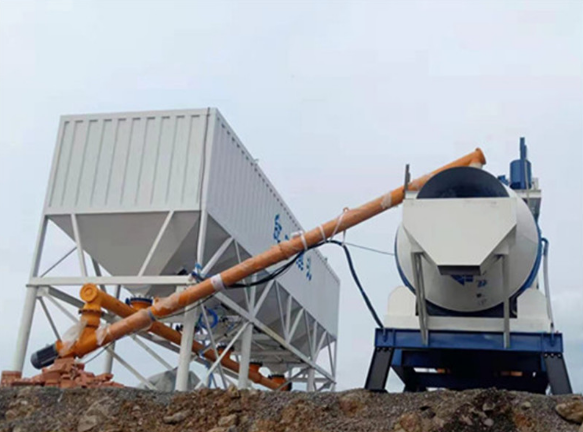Unique Features of Mini Concrete Batching Plants
Introduction
Mini concrete batching plants, also known as small concrete mixing plants or mini mix concrete plants, are compact and efficient solutions for producing small to medium quantities of concrete. These plants offer several unique features that set them apart from larger, conventional concrete batching plants. In this article, we will explore the distinctive characteristics and advantages of mini concrete batching plants.
I. Compact Design and Portability
One of the most prominent features of mini concrete batching plants is their compact and portable design. These plants are specifically engineered to occupy minimal space and can be easily transported to different job sites. Key aspects of their compact design include:
1. Space Efficiency: Mini batching plants are designed to fit into small spaces, making them suitable for urban construction projects with limited area availability.
2. Mobility: Their portability allows for quick and hassle-free relocation to different sites, reducing downtime and transportation costs.
3. On-Site Mixing: Mini batching plants enable concrete production directly at the construction site, eliminating the need to transport concrete from a central mixing facility.
II. Cost-Effectiveness
Mini concrete batching plants are known for their cost-effectiveness, primarily due to the following features:
1. Lower Initial Investment: These plants have a lower upfront cost compared to larger batching plants, making them an attractive option for small and medium-sized construction companies and startups.
2. Reduced Operating Costs: Mini batching plants are designed to be energy-efficient and require less manpower for operation and maintenance, further lowering operating expenses.
3. Quick ROI: The combination of lower initial costs and efficient operation often results in a quicker return on investment (ROI) for mini concrete batching plants.
III. Versatility in Concrete Production
Despite their smaller size, mini concrete batching plants are versatile and can produce various types of concrete mixes, including:
1. Standard Concrete: They can produce standard concrete mixes for a wide range of applications, such as building foundations, pavements, and residential construction.
2. Specialty Mixes: Mini batching plants can also produce specialty concrete mixes, such as lightweight concrete, high-strength concrete, and self-compacting concrete, depending on the specific requirements of the project.
3. Precast Concrete: Some mini concrete batching plants are equipped to produce precast concrete elements like blocks, pavers, and small precast components.
IV. Quick Setup and Operation
Mini concrete batching plants are designed for ease of setup and operation:
1. Rapid Installation: These plants can be installed quickly, often within a day, allowing construction projects to commence without delays.
2. Simple Operation: Mini batching plants are user-friendly and require minimal training for operation, making them suitable for a wide range of operators and site personnel.
3. Batching Accuracy: Despite their small size, mini batching plants offer precise weighing and batching of materials, ensuring consistent concrete quality.
V. Environmental Friendliness
Many mini concrete batching plants are designed with environmental considerations in mind:
1. Reduced Emissions: These plants often incorporate features to minimize dust emissions and air pollution, helping to meet environmental regulations.
2. Resource Efficiency: Mini batching plants are efficient in their use of materials, reducing waste and conserving resources.
3. Energy Efficiency: They are designed to be energy-efficient, consuming less power and reducing the carbon footprint of concrete production.
VI. Maintenance and Serviceability
Mini concrete batching plants are engineered for ease of maintenance:
1. Accessible Components: Critical components are easily accessible for inspection and maintenance, reducing downtime.
2. Availability of Spare Parts: Spare parts for mini batching plants are typically readily available, ensuring quick replacements and minimal disruption to operations.
3. Remote Monitoring: Some modern mini batching plants are equipped with remote monitoring systems that allow for real-time monitoring of operations and early detection of potential issues.
Conclusion
Mini concrete batching plants offer a range of unique features and advantages that make them an excellent choice for small to medium-scale concrete production projects. Their compact design, cost-effectiveness, versatility, and environmental friendliness make them a valuable asset in the construction industry. Whether for residential construction, small infrastructure projects, or precast concrete production, mini batching plants provide efficient and reliable solutions, enabling construction companies to meet their concrete needs with efficiency and economy.
 следующий: How Does a Concrete Mixer Pump Work
следующий: How Does a Concrete Mixer Pump Work













